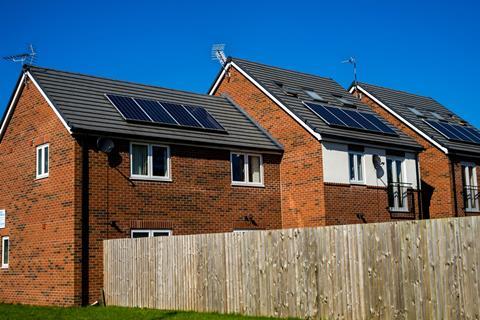The Committee on Climate Change has recommended a much simpler test for assessing a newly-built home’s energy performance

Recommendations by the influential Committee on Climate Change that tests to monitor the energy efficiency of newly-built homes be greatly simplified could change the culture of housebuilding in the UK at a stroke, according to industry figures.
The CCC, headed by Lord Deben – the former Conservative environment secretary John Selwyn-Gummer – recommended amending building regulations so that instead complicated theoretical calculations using the Building Research Establishment’s SAP software being used to determine a building’s compliance, a system be used that measures the actual energy performance of homes once they are built.
The “absolute” energy performance system envisaged would allow the performance of a built home to be simply tested for the first time, giving a mechanism to monitor – and close – the well-recognised “performance gap” between homes on paper and as built. For housebuilders and contractors, this potentially raises the bar even further.
Lynne Sullivan, an architect with consultant SustainableByDesign, said: “Real verification of actual built performance, backed by a housing ombudsman, will do the job [of tackling the performance gap].
“The important thing is to make housebuilders accountable. If they are judged by the results, then the whole culture changes.”
The CCC’s recommendations, published in its housebuilding report last month, may have influenced the announcement by Chancellor of the Exchequer Philip Hammond in his Spring statement of the creation of a Future Homes Standard, due to come into effect in 2025, which pledges an end to gas heating in homes by that year.
Sullivan said that having seen the zero carbon homes target scrapped by the Conservative government in 2015, “the idea of a new standard is really exciting. It’s been a long time since we’ve felt a re-invigoration of this agenda”.
And if the CCC’s recommendations are implemented some believe it will have a big impact on the way homes are built.
Emily Braham, head of sustainable energy at local authority housing manager Nottingham City Homes, said she would like to be able to employ builders on the basis they guarantee the energy performance of the homes to be.
“We do want to move to this,” she says. “But it does have a cost. The performance should be the responsibility of the people who design and build the home.”
This can only be made affordable, she says, when the government introduces national standards which move the market in this direction. “As soon as this is a fixed standard the costs of doing it will reduce dramatically,” she says.
David Adams, technical director at green housebuilder Melius Homes, and a founder of the now-defunct Zero Carbon Hub quango set up to deliver the 2016 policy, said: “Frankly if they end up going for anything short of the CCC proposals it’d be bizarre.
“If they don’t have the intention to follow through with that level of ambition, then it would probably have been better they hadn’t said anything.”
While the CCC recommendations would add around £6,900 to the cost of a new home and some housebuilders are known to prefer a deregulated approach, the House Builder’s Federation said it doesn’t want to stand in the way of a green home strategy, rather it wants it to be “workable”.
“Obviously it will be important to the industry that however this objective is taken forward isn’t damaging to it – hopefully that’s a shared objective with government,” said John Slaughter, external affairs director at the HBF.










2 Readers' comments